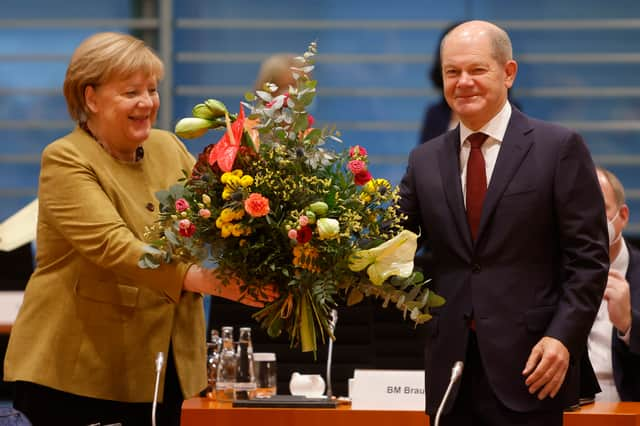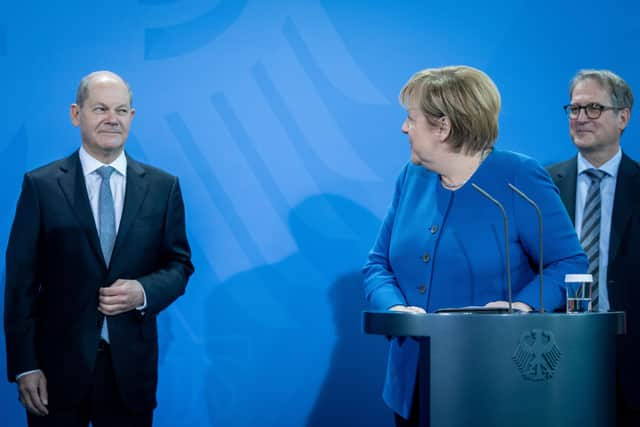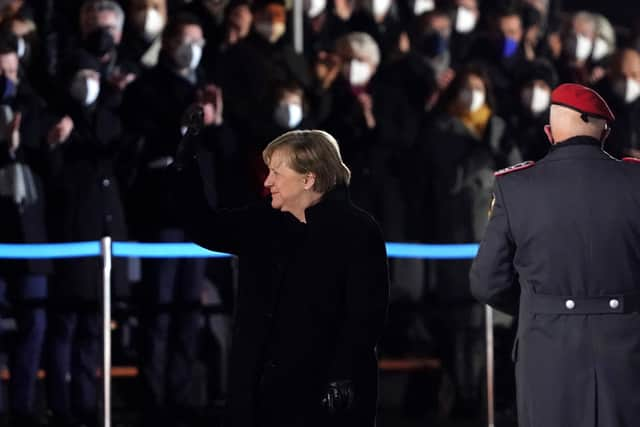Olaf Scholz: who is Angela Merkel’s replacement as German Chancellor - and why did she step down?
This article contains affiliate links. We may earn a small commission on items purchased through this article, but that does not affect our editorial judgement.


Germany has transitioned through a monumental moment as long-serving Chancellor Angela Merkel stepped down from the role and handed reins over to Olaf Scholz.
Merkel had been German Chancellor for 16 years before making the announcement following her party’s win at the 2018 election that she would be serving her final term.
Advertisement
Hide AdAdvertisement
Hide AdBut who is Scholz, when did he become the new German Chancellor and why has Merkel stepped down?
Who is Olaf Scholz?
Olaf Scholz is the current Vice Chancellor of Germany and is expected to be sworn in as Merkel’s replacement as Chancellor after winning the Social Democratic Party (SDP) nomination.
The 63-year-old served as the First mayor of Hamburg between 2011 and 2018 and deputy leader of the SDP from 2009 and 2019.
Scholz, who belongs to the centrist wing of the party, won the SDP nomination as German Chancellor after Merkel announced that she would be standing down.
Advertisement
Hide AdAdvertisement
Hide AdAfter the party won the most recent German election with a narrow victory and a coalition was created between the SDP, Greens and the Free Democratic Party (FDP), it was confirmed that Schoz would take over the post as Chancellor after Merkel’s departure.
His appointment will mark a departure from the SDP’s leftwing leadership.
When did Olaf Scholz become German Chancellor?
Merkel stepped down from the role of German Chancellor in a ceremony on Thursday 2 December.
However, she held the role of caretaker Chancellor until Scholz was sworn in on Wednesday 8 December.


Advertisement
Hide AdAdvertisement
Hide AdBefore he was sworn in, all three parties in the coalition approved the coalition’s agreement, named Dare More Progress.
Party leaders signed the 177-page document at Berlin’s Futurium Museum on Tuesday 9 December
The German parliament - the Bundestag - confirmed his ascension to the role via a vote on Wednesday 8 December.
Why did Angela Merkel step down as German Chancellor?
After four terms in office, Merkel announced in October 2018 that she would stand down as the leader of the Christian Democratic Union.
Advertisement
Hide AdAdvertisement
Hide AdIn a press conference following her party’s success in the 2018 election, she said: "I will not be seeking any political post after my term ends."


It is believed that Merkel took the decision to step down in an attempt to revitalise the Christian Democratic Union (CDU), which has lost many voters to parties such as the leftwing Greens and rightwing Alternative for Germany.
She added: “As chancellor and leader of the CDU I’m politically responsible for everything, for successes and for failures.
"When people are telling us what they think of how the government was formed and what they think of our work during the first seven months of this parliament... then it is a clear signal that things can’t carry on as they are.
"The time has come to open a new chapter."
What is Angela Merkel’s lasting political legacy in Germany?
Advertisement
Hide AdAdvertisement
Hide AdAfter being named as Germany’s first female Chancellor on 22 November, 2005, Merkel became one of the most powerful leaders in Europe.
She governed during the economic crash in 2007 and 2008, and, alongside former French President Nicolas Sarkozy, championed a policy of austerity for Europe’s largest economies during the recovery period.
The Russian annexation of Ukraine in 2014 and conflicts in Syria and Afghanistan among others led to the largest refugee crisis in Europe since World War Two.
Merkel responded by maintaining that Germany would keep its borders open to those seeking refuge.
Advertisement
Hide AdAdvertisement
Hide AdAs a result, Germany took in more than one million refugees in 2015, which was unpopular with many voters and support for the Christian Democratic Union began to decline.
In 2017, same-sex marriage was legalised in Germany, despite Merkel voting against the bill.
Her and her party’s opposition towards same-sex marriage, which was widely-backed the German public, marked another dent in the CDU’s and Merkel’s popularity.
She continued to govern during her final term, much of which was marred by the Covid-19 pandemic.
Advertisement
Hide AdAdvertisement
Hide AdLike much of Europe, Germany was launched into lockdown to curb the original rise of the virus and, as of December 2021, records some of the continent’s lowest vaccination rates.
In her final press conference as German Chancellor on Thursday 2 December, Merkel and Scholz announced a further lockdown for unvaccinated citizens and a warning that vaccines may become mandatory, amid soaring Covid cases in the country.
A message from the editor:
Thank you for reading. NationalWorld is a new national news brand, produced by a team of journalists, editors, video producers and designers who live and work across the UK. Find out more about who’s who in the team, and our editorial values. We want to start a community among our readers, so please follow us on Facebook, Twitter and Instagram, and keep the conversation going. You can also sign up to our email newsletters and get a curated selection of our best reads to your inbox every day.
Comment Guidelines
National World encourages reader discussion on our stories. User feedback, insights and back-and-forth exchanges add a rich layer of context to reporting. Please review our Community Guidelines before commenting.
